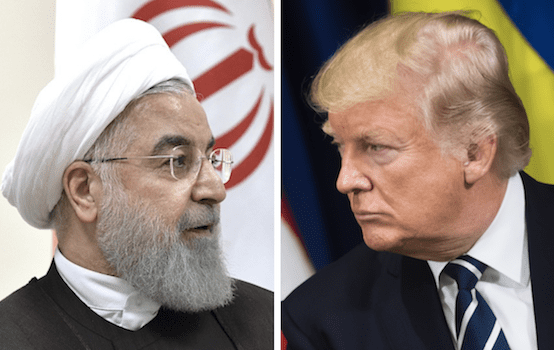Why Trump’s Iran Policy Fails

John Limbert comments on the Trump administration’s sanctions on Zarif and their bankrupt Iran policy as a whole:
The administration is not punishing an individual. It is rejecting the entire idea of diplomacy. Of course, it is no secret that Trump and company despise the practice of diplomacy, with its careful choice of language, and its emphasis on listening, empathy, and credibility. Like Casey Stengel’s 1963 Mets, they don’t know how to play the game and have chosen chest-beating and self-righteousness instead. Zarif may have a terrible case to argue, but he argues it as a professional.
We learned that Senator Rand Paul recently invited Zarif to meet President Trump at the White House. As Alice would say, “Curiouser and curiouser.” So far, there’s no sign the Iranians are ready for such a meeting. What did the president expect? Does he not realize the depth of mistrust that exists when his Secretary of State issues surrender demands to the Iranians and his national security advisor is a paid shill for the same Iranian opposition group that paralyzed the supreme leader’s right arm in an assassination attempt?
Limbert is right about all this, and I agree with him when he laments that there are no adults in charge capable of conducting a more rational and responsible foreign policy. Trump’s disdain for diplomacy has been obvious since the beginning of his presidency, and that disdain is one reason why his major foreign policy and trade initiatives fail to achieve their stated goals and lead to escalation and crisis. Trump and the officials around him are incapable or unwilling to see things as the other government sees them, they refuse to show the other government respect, and they are completely inflexible in their maximalist demands. There is no possibility of diplomatic progress when the Trump administration’s answer for everything is always more pressure, whether in the form of sanctions, tariffs, or both. All of this is on display with Trump’s Iran policy, which has amounted to breaking our government’s promises, betraying Iran’s trust, waging unjustified economic war against them, and pursuing a policy of regime change in all but name. Iran’s leaders have no incentive to talk to a deal-breaking, untrustworthy, aggressive government that seeks their destruction, and the Zarif sanctions confirm that the administration never really wanted to talk in the first place.
In addition to all that, there is a basic failure to understand the Iranian government’s behavior that distorts the Trump administration’s perception. I have recently been reading Gerard Toal’s Near Abroad, a very interesting study of the 2008 war with Georgia and the conflict in Ukraine and how these conflicts have been interpreted by the many political actors involved. There is one observation from the book that he made about how some Westerners see Russia that could just as easily be applied to how they see Iran. Toal writes:
Because most analysts are foreign to the state and culture under consideration, and because they have limited or no direct access to the private deliberations of state leaders, there is a general tendency to attribute observable public behavior to innate dispositional features of that leader, regime, or country. What this essentializing tendency does is systematically downplay, marginalize, and ignore the situational, contextual, and spatial factors that may account for state behavior.
He continues a little later:
This general habit is important for what it neglects. First, it tends to discount the detailed, empirical, contextual circumstance of a crisis. Contra Kagan, the details of who did what to precipitate Russia’s invasions are very significant….the practice provides little to no room for situational interpretations of foreign policy actions or efforts to see events through an adversary’s eyes. What leaders actually say about why they acted tends to be discounted or rewritten to conform to existing presumptions about their character, regime, and state. (p. 26)
Toal has more to say about this, but for our purposes this is enough to understand what he means. We have seen this habit in the way that Trump administration officials willfully misinterpret every Iranian action according to their assumptions and prejudices about why their government acts the way that it does. If Iran starts to exceed the limits set by the JCPOA, they assume that the “only” explanation for it is that they are seeking nuclear weapons. If Iran seizes an oil tanker after one of theirs was also seized, they ignore the context and assume that this is simply proof of the “revolutionary” regime’s malign nature. Despite deliberately provoking and threatening Iran for more than a year, the Trump administration casts everything Iran does as “aggression” because they insist on seeing Iran as the aggressor no matter what. Likewise, the Trump administration refuses to see that Iran has developed its missile program for defensive purposes following their experience in the war with Iraq, and instead portray every Iranian missile test as having something to do with developing ICBMs that Iran doesn’t have and isn’t trying to build.
Interpreting another state’s actions in reductive, essentializing ways is useful for vilification and propaganda purposes, but it guarantees misunderstanding why the other state acts the way it does and it usually leads to taking provocative and destabilizing actions that predictably cause the other state to react badly. Hawks that fall into the habit that Toal describes consistently fail to understand the other state’s view of the world, and so they continually blunder ahead into avoidable crises and conflicts.
Comments